HOME >> METRO SHANGHAI
The white pollution war
Source:Global Times Published: 2016-2-24 17:28:01
Plastic bag regulations fail to stop shoppers recycling
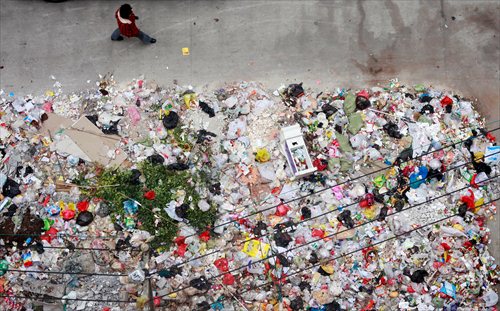
Discarded plastic bags are a major source of white pollution. Photo: Yang Hui/GT
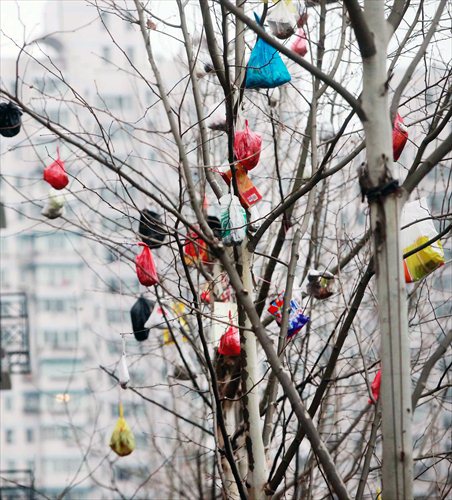
Discarded plastic bags can prove an eyesore as well as a pollutant. Photo: Yang Hui/GT
Seven years ago the Chinese government banned shops from providing free plastic shopping bags in a bid to battle white (plastic) pollution. There was a call for a return to the cloth bags of old. However a recent investigation by the Shanghai newspaper the Laodong Daily found Shanghai residents haven't yet got into the habit of taking recyclable bags when they go shopping and low quality plastic bags are still widely used.
On June 1, 2008, China banned supermarkets, department stores and grocery stores from offering free plastic bags, and limited bought plastic bags to be no thinner than 0.025 mm. The National Development and Reform Commission (NDRC) said that over the past years the ban had helped cut consumption of plastic bags by at least 1.4 million tons, saving an equivalent of 8.4 million tons of oil, 12 million tons of coal and 30 million tons of carbon dioxide.
However, in daily life, reporters found customers were still much more willing to pay for a plastic bag - it has proved much more convenient to spend a dime than carry an old-fashioned material bag with them. As a result, supermarkets and department stores have been the biggest winners from the policy - before the ban was introduced, they spent large sums of money every year providing free bags but now they get paid for the service.
On one weekend morning, within 20 minutes a Laodong Daily reporter saw more than 40 customers walk out of a supermarket store in Changning district with at least one brand-new plastic bag. During that period, in contrast, only nine customers were seen with material or recyclable bags - most of them were senior citizens.
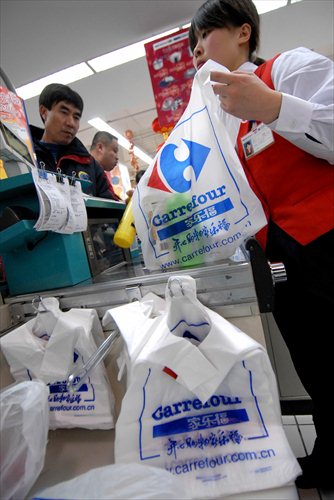
Selling plastic bags has proved a money-making bonus for supermarkets. Photo: CFP
Usually pay
"I rarely carry a plastic bag for shopping and usually pay for a new one when I come to the supermarket. It's then used as a garbage bag when I go back home," one young customer told the reporter.
Many agree with this behavior - a plastic bag costs about three jiao (less than 5 cents), a miniscule amount compared to the total for the shopping and few mind forking out for the convenience.
A supermarket worker told the reporter that in the early days of the ban, the supermarket offered no plastic bags at all, but they found not every customer understood this policy. Nowadays most elderly customers have got used to bringing plastic bags with them, but very few young customers do this.
In wet markets few people bother to bring their own bags as free plastic bags are still available and it's common for vendors to hand out hundreds of bags a day. There is another problem here: these bags are thinner than 0.025 mm, too thin to be reused and invariably abandoned after being used once.
Every year 400 million tons of plastic items are used worldwide and China uses 15 percent of these. In 2015, 700,000 tons of plastic bags were used in China - 300,000 tons of these came from the retail industry, from shops, supermarkets and department stores.
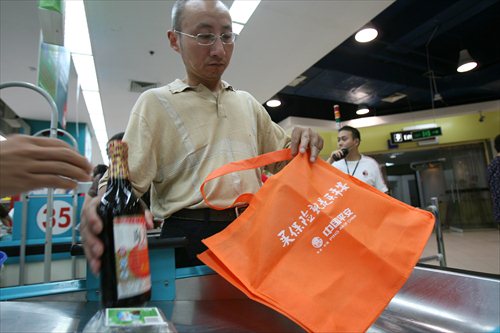
Very few customers go shopping with recyclable bags - some elderly people do this. Photo: CFP
Few alternatives
One reason why plastic bags dominate is that customers have few alternatives available. "Although I know that plastic bags are a major source of pollution and should be reduced, I have no other choice. Often there are no recyclable bags on sale in supermarkets and if there are they are expensive - a few jiao for a plastic bag is easier," a woman surnamed Xu told the Workers' Daily.
And some customers who don't want to pay for plastic bags use the free bags provided for fresh meat, fruit or vegetables for all their purchases. "It's more important to improve public awareness rather than just stop supplying plastic," a supermarket worker commented.
Supermarkets have taken the ban on free bags as an opportunity to make money - with some making over 10 million yuan yearly selling plastic bags. To increase profits, some supermarkets use thin and cheap plastic bags which are usually nondegradable.
"The supermarket announcements keep reminding us that their plastic bags are made of new recyclable materials, which suggests that customers should buy several bags in case one bag breaks on the way home," said a customer.
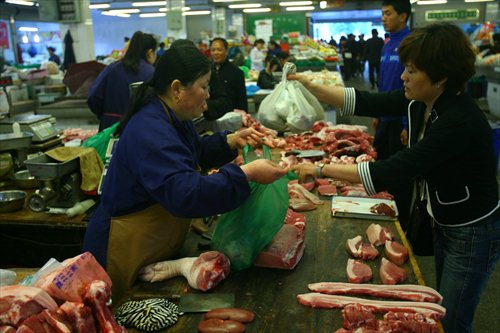
Free plastic bags are usually offered at wet markets. Photo: CFP
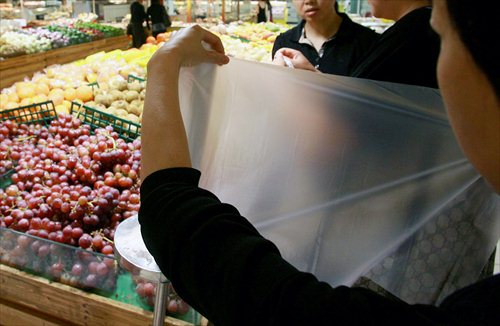
Some customers use the free plastic bags provided for fresh meat, fruit or vegetables for all their purchases. Photo: CFP
Many involved
Several authorities are involved in the administration of the plastic bag ban. The commerce and industry administration, the bureau of quality and technical supervision and the environmental protection bureau all share responsibilities and some experts have suggested that they should work together more closely to curb plastic bag usage and crack down on illegal plastic production and trade.
Other experts suggest there should be a wider use of degradable plastic bags because many customers feel it's inconvenient to bring recyclable bags and it's impossible to stop using plastic bags completely.
In developed countries that have banned free plastic bags to reduce the usage, the number of plastic bags used decreased but, fundamentally, this didn't solve the plastic pollution problem.
Experts suggest the ban on free plastic bags would only be effective if people were sufficiently concerned and changed their habits completely, and the government introduced strict supervision.
Compiled by the Global Times based on reports in the Laodong Daily and the Workers' Daily
Posted in: Metro Shanghai